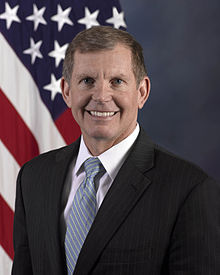Michael D. Lumpkin
| Michael D. Lumpkin | |
|---|---|
 |
|
| Under Secretary of Defense for Policy | |
|
In office December 2, 2013 – June 24, 2014 |
|
| Preceded by | James N. Miller |
| Succeeded by | Christine E. Wormuth |
| Personal details | |
| Born |
October 14, 1964 Oceanside, California, U.S. |
| Political party | Democrat |
| Alma mater |
University of California, San Diego Naval Postgraduate School |
| Military service | |
| Allegiance |
|
| Service/branch | United States Navy |
| Years of service | 1986–2007 |
| Rank | Commander |
| Unit | U.S. Navy SEALs |
Michael D. Lumpkin (born October 14, 1964) is a former American Naval Officer and businessman who served as the Special Envoy and Coordinator of the Global Engagement Center at the U.S. Department of State until January 2017. From 2013 until 2016, he was the Assistant Secretary of Defense for Special Operations and Low Intensity Conflict. During that time, he also served as the acting Under Secretary of Defense for Policy, the third-highest civilian job at the Department of Defense (DoD).
Lumpkin is considered an experienced crisis manager and turnaround expert. Prior to his current role overhauling U.S. government efforts to disrupt extremist propaganda, he led the DoD response to the Ebola crisis in West Africa, efforts to locate and return Sergeant Bowe Bergdahl, and the reorganization of the military’s broken POW/MIA program.
As a Navy SEAL, Lumpkin served nine operational tours, one Commanding a Team, in counter-insurgency and counter-narcotics operations around the world, including in Iraq, Afghanistan, the Horn of Africa, the Philippines, and Central and South America.
Lumpkin was born in Oceanside, California to his parents, David and Jeri Lumpkin. They raised Lumpkin and his brother in nearby in Vista, California. His father served in the U.S. Marine Corps, and his brother currently serves as a Chief Master Sergeant in the U.S Air Force.
Lumpkin graduated from the University of California, San Diego in 1986, and subsequently earned his Master’s Degree in National Security Affairs from the Naval Postgraduate School in Monterey, California. His thesis analyzed incidents of violence at sea between 1975 and 1995.
After graduating from college, Lumpkin joined the U.S. Navy. Before becoming a Navy SEAL, Lumpkin did an abbreviated tour on the USS Vancouver, where he qualified as a Surface Warfare Officer. He began his career as a SEAL taking part in counter-narcotics operations in Latin America, mainly operated out of Panama. During this time, he held every leadership position from Platoon Commander to Commanding Officer, and he was formally recognized by the Armed Forces Preparedness Association for his Outstanding Contributions to National Security.
Immediately after the attacks of September 11, 2001, he was assigned as the Officer in Charge for the training and readiness of all West Coast SEAL Teams. The Teams he trained took part in the invasions of both Afghanistan and Iraq while sustaining zero casualties.
During Operation Iraqi Freedom, Lumpkin served as Deputy Commander of the Joint Special Operations Task Force for the Arabian Peninsula. He then served as the Deputy Commander of all Special Operations in Iraq. In that role, he oversaw the daily operations of more than 2,000 Special Operators, and activities at six High Value Target interrogation facilities.
Lumpkin returned from Iraq for his final military assignment, working as a liaison to the U.S. Congress on policy and funding issues to support U.S. Special Operations Forces. He is recognized by the Department of Defense as a specialist in both the Western Hemisphere and Special Operations/Low Intensity Conflict.
...
Wikipedia
